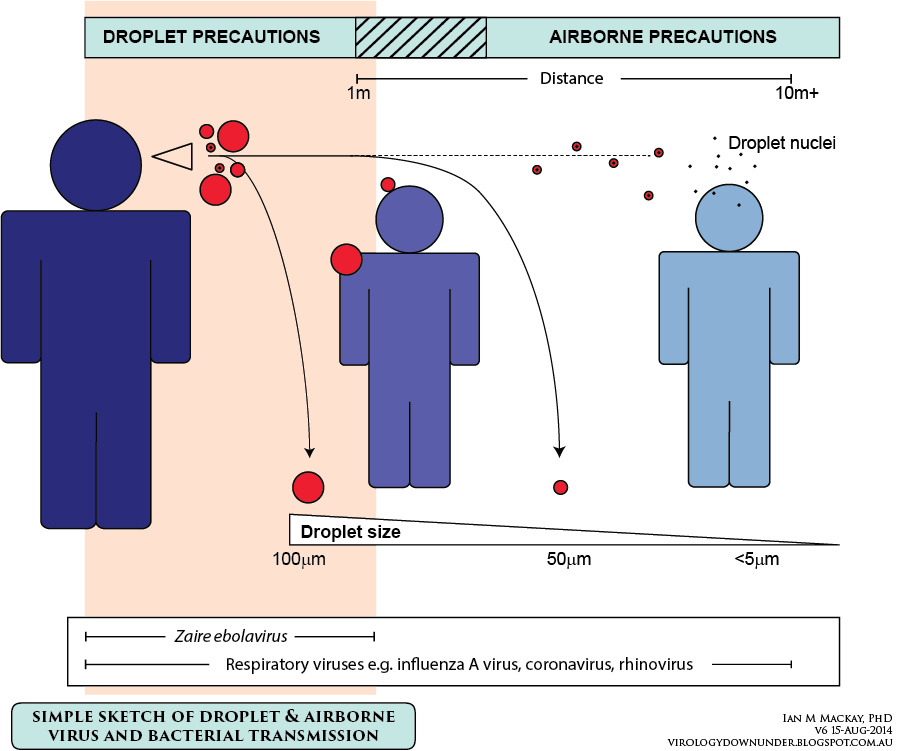Critical Thinker
Senior Member.
The fear-mongering conspiracy website called 'The Anti Media' that is run by the same person that is the organizer and founder of March Against Monsanto, Nick Bernbabe has this headline and story, fortunately based on the comments, not everyone is fooled.:
Link
Link
CDC Admits Ebola Could Be Airborne
Aaron Nelson
October 8, 2014
(TheAntiMedia) According to Centers for Disease Control and Prevention Director Tom Frieden, the Ebola virus might be airborne.
“It’s the single greatest concern I’ve ever had in my 40-year public health career,” said Dr. Michael Osterholm, director of the Center for Infectious Disease Research and Policy at the University of Minnesota. “I can’t imagine anything in my career- and this includes HIV- that would be more devastating to the world than a respiratory transmissible Ebola virus.”
Experts are increasingly expressing fears that the Ebola virus can spread through droplets suspended in the air. This would explain the unprecedented increase in the number of Ebola cases in 2014. You probably didn’t hear about it on the corporate news, but a little less than 2 months ago the CDC updated their criteria for Ebola transmission to include “being within 3 feet” or “in the same room” as someone infected with the virus.
From the CDC’s website:
“A low risk exposure includes any of the following:
Household member or other casual contact with an EVD patient.
Providing patient care or casual contact without high-risk exposure with EVD patients in health care facilities in EVD outbreak affected countries.“
How does CDC define “casual contact“?
“Casual contact is defined as a) being within approximately 3 feet or within the room or care area for a prolonged period of time while not wearing recommended personal protective equipment or having direct brief contact (e.g., shaking hands) with an EVD case while not wearing recommended personal protective equipment.”
A study conducted in 2012 showed the Ebola virus was able to travel between pigs and monkeys that were in separate cages and never placed in direct contact.
Dr. Gary Kobinger, from the National Microbiology Laboratory at the Public Health Agency of Canada, told BBC News nearly two years ago that he believed Ebola was spread by droplets suspended in the air.
“What we suspect is happening is large droplets; they can stay in the air, but not long; they don’t go far,” he explained. “But they can be absorbed in the airway, and this is how the infection starts, and this is what we think, because we saw a lot of evidence in the lungs of the non-human primates that the virus got in that way.”
This strain of Ebola is not Ebola Zaire. This is a new strain. According to the CDC, this virus is genetically 97% similar to the Zaire strain. I don’t know about you, but my DNA is 97% similar to orangutans.
Related: Preventative Measures for Ebola in Case of an Outbreak
Is this why Dr. Gil Mobley showed up at the Atlanta airport in a Hazmat suit protesting that the ‘CDC is lying‘, because he thinks the CDC is ‘sugar-coating‘ how serious a threat Ebola is to the United States? This document reveals that the CDC is concerned about airborne transmission of Ebola. Airline staff are being urged to provide surgical masks to anyone suspected of being infected in order “to reduce the number of droplets expelled into the air by talking, sneezing, or coughing”.
How did the Spanish nurse became the first person in the world to catch Ebola outside of Africa? The European Commission actually asked Spain to explain how she could have become infected, you know, if the virus is not airborne.
How else do you explain how an NBC News cameraman, wearing full body protective gear, was able to catch Ebola? The CDC predicts 1.4 million people will be infected with Ebola by January. How many of these people will be Americans? If you think the U.S. should ban air travel to and from the infected countries of West Africa, do you think the rest of the world should ban air travel to and from the United States if an Ebola outbreak starts in say, Dallas? The solution to the Ebola outbreak in West Africa was 4,000 U.S. troops, and the virus is now outside of Africa. So, what will the solution look like in the United States?
It’s not a good sign when basic questions such as these are being ignored during a potential Ebola virus outbreak in America.
This is how Ebola can be spread, according to the CDC. Is Ebola airborne? The definition of ‘airborne‘ is ‘moving or being carried through the air‘. You be the judge.
“Unlike respiratory illnesses like measles or chickenpox, which can be transmitted by virus particles that remain suspended in the air after an infected person coughs or sneezes, Ebola is transmitted by direct contact with body fluids of a person who has symptoms of Ebola disease. Although coughing and sneezing are not common symptoms of Ebola, if a symptomatic patient with Ebola coughs or sneezes on someone, and saliva or mucus come into contact with that person’s eyes, nose or mouth, these fluids may transmit the disease.”

